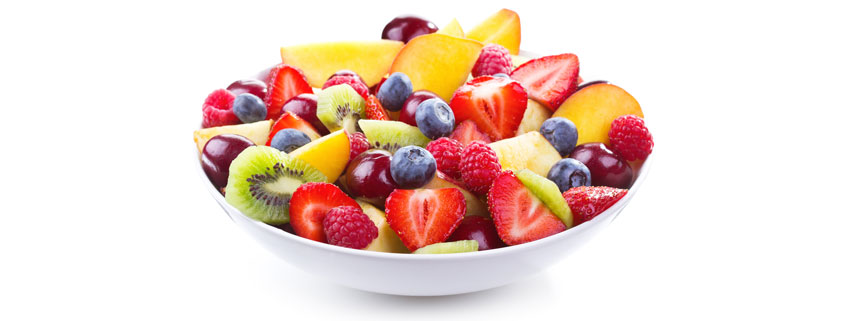Despite the myriad benefits associated with a diet rich in colorful fruits and vegetables, many health professionals often recommend that folks limit fruit intake when they’re trying to lose weight, and militant health “gurus” may go so far as to suggest the complete elimination of fruit from the diet when trying to optimize fat loss.
As a result, many clients come to me asking, “Is fruit bad for fat loss?” Or, “I’m having trouble losing fat; is it because I eat fruit?”
While fresh fruit does contain some naturally-occurring sugar, steadily-rising rates of overweight and obesity have far more to do with overconsumption of refined carbohydrates and added sugars than they do with eating too much fruit.
Fresh fruits are rich in important micronutrients (e.g., vitamins and minerals), and they are also packed with important phytochemicals, which act as potent antioxidants that help combat free radicals and reduce oxidative stress. What’s more, fruits are also a very good source of dietary fiber, which can promote a healthy digestive tract and regularity, improve carbohydrate management (e.g., slowed gastric emptying), promote satiety, reduce calorie intake, and enhance weight loss.
In one study, researchers from the School of Public Health at the University of Minnesota examined the dietary habits of over 1,800 overweight men and women for two years, and they found that increased fruit intake was significantly associated with decreased body weight.
In another study published in the journal Public Health Nutrition, Dutch researchers analyzed the nutrition habits of 288 men between the ages of 50 and 65 for five years, and they found that decreased fruit intake was significantly related to increased body weight and waist circumference.
In a study published in the journal Appetite, researchers from Brazil compared the effects of adding either fruit (apples or pears) or oats to the diets of overweight women on calorie consumption and body weight. Over the course of 10 weeks, the researchers found that women who added three daily servings of fruit to their usual diets lost over 5 times more weight than women who added oats, despite the same number of calories and fiber in the fruit and oats.
In a recent study published in Nutrition Journal, researchers from Denmark played devil’s advocate to see if removing fruit from the diets of participants would aid in weight loss. No such luck. Not only did the researchers find that the low-fruit group (i.e., no more than 1 piece per day) didn’t lose more weight than the high-fruit group (i.e., 2 pieces or more per day), they found that the folks in the high-fruit group lost 47% more weight and 43% more inches from their waistlines than the low-fruit group.
With all of that being said, it seems both prudent and pragmatic to incorporate fruit in your nutrition plan when your goal is to optimize fat loss, and with that in mind, here are some of my favorite choices:
- Avocados are rich in fiber, important micronutrients and healthy fats that can help increase the absorption of phytonutrients from other vegetables and fruits. Avocados are also one of the best dietary sources of glutathione, which is considered the body’s “master antioxidant.”
- Blueberries, which, as discussed in a previous newsletter, are loaded with phytonutrients that may have cardioprotective, anti-aging, anti-obesity, and performance enhancing effects.
- Apples are packed with fiber and key fat-fighting polyphenols including flavonols (e.g., quercetin), catechins, anthocyanins, chlorogenic acid, phloridizin, and more. These flavonols have been shown to improve insulin sensitivity and reduce the body’s absorption of carbohydrates.
- Bananas are often undeservedly shunned, but the truth is, they’re a very good source of a number of key micronutrients (besides potassium), and they’re also one of the few good dietary sources of resistant starch, which acts as a food source for the healthy gut bacteria leading to the production of short-chain fatty acids that fuel the immune cells of the gut. Resistant starch may also increase metabolic rate, increase fat burning, decrease fat storage, and improve insulin sensitivity.
- Grapefruit are an excellent source of vitamin C, which is a potent antioxidant and may help promote a healthy stress response by reducing levels of the stress hormone cortisol. In a study published in the Journal of Medicinal Food, researchers from the Scripps Clinic in California found that overweight folks consuming fresh grapefruit three times daily before meals lost 5 TIMES more weight than the placebo group (i.e., no grapefruit) over the course of 12 weeks.
- Kiwifruit contains serotonin and has been shown to have beneficial effects on sleep. In a recent study published in the Asia Pacific Journal of Clinical Nutrition, researchers from Taiwan found that middle-aged adults who consumed two kiwifruits one hour before bedtime every night for four weeks experienced significantly improved sleep. Kiwifruit is a good source of prebiotic fiber, and studies have shown that kiwifruit can improve GI motility and digestive function.

